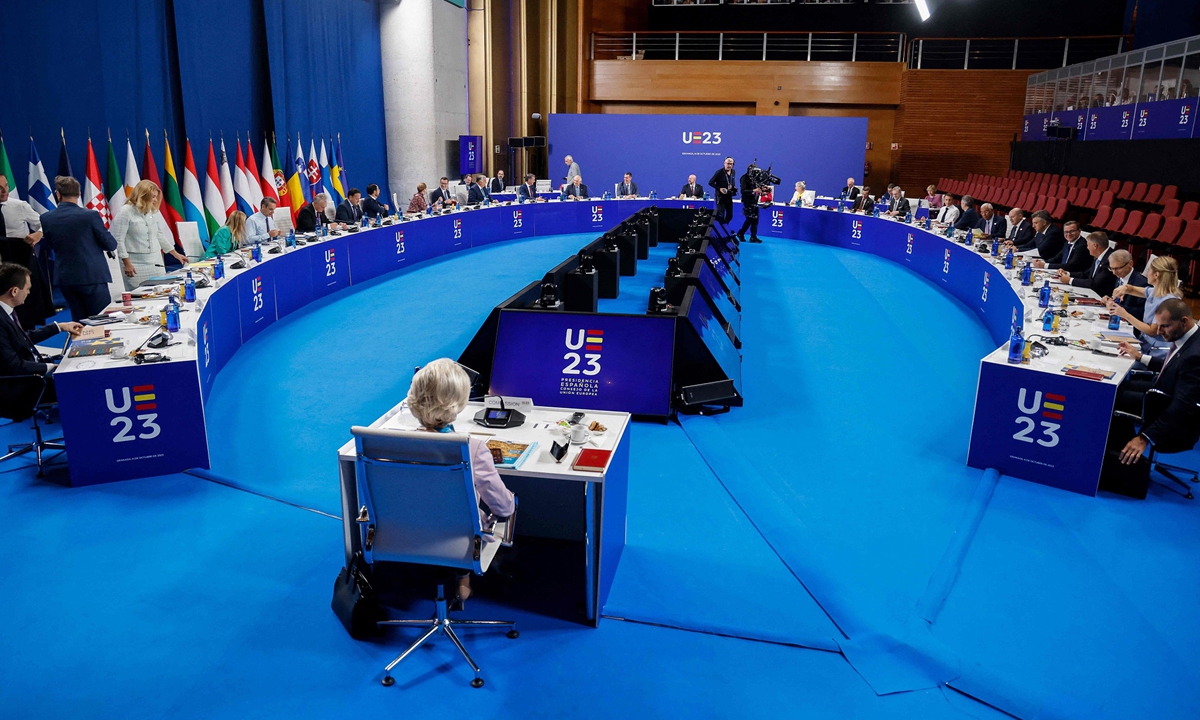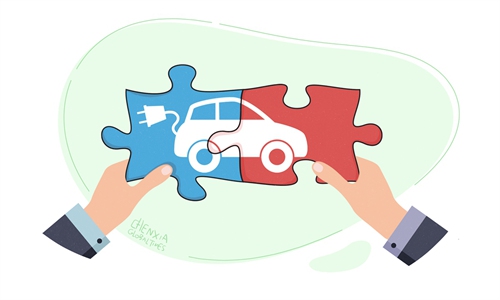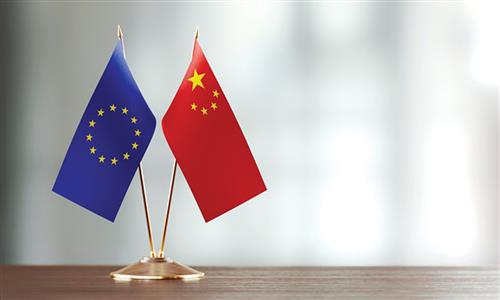EU weighs up economic security strategy amid global tensions; 'de-risking may aggravate bloc’s internal conflicts, undermine unity'

European Heads of state take part in a plenary session during the European Council Informal Meeting in Granada, southern Spain on October 6, 2023. Photo: VCG
As European leaders gathered in Spain's Granada to discuss the EU's future strategic agenda and tackle economic and geopolitical challenges on Friday, the bloc's economic direction, against the backdrop of its probe on Chinese new energy vehicles (NEV) and de-risking push, has prompted concerns in China.The increasing China-EU interactions in recent months have added positivity to bilateral relations, yet the bloc has also shown stronger tendency of overusing the concept of "security" in economic field.
Observers warned that if such an approach to generalize security concept dominates the bloc's policymaking, it would not only cause a lose-lose scenario for China and European companies, but also aggravate the EU's internal conflicts between EU member states, between different social classes, and ultimately undermine EU's strength, unity and autonomy.
Vague strategy
The informal meeting of heads of state or government on Friday covers topics including security, defense and cyber resilience; long-term competitiveness and the EU single market; the green and digital transitions; multilateralism and global partnerships.
Reuters reported the EU wants to retain its industrial edge and competitiveness in a world shifting more to digital and green products, but has found itself worryingly dependent on others, particularly China, for critical minerals.
Amid the Ukraine crisis and a US-China standoff, risk is a key word for the 27-nation bloc's economic policy as it ponders how to guarantee supply chains and how widely to share technology, according to Reuters.
The EU leaders' meeting is a preliminary step for the EU to communicate varying stances and maximize consensus, meaning it is far from reaching any substantial strategy, Cui Hongjian, a professor with the Academy of Regional and Global Governance with Beijing Foreign Studies University, told the Global Times on Friday.
Even if a "strategy" can be formulated in the future through compromises, EU members will vary a lot in attitudes and actions to implement those EU policies at domestic level, Cui noted.
Sun Keqin, a research fellow at the China Institutes of Contemporary International Relations, told the Global Times on Friday that any EU policy has to consult with different countries and take full consideration of different social classes; otherwise it will face huge hurdles in implementation.
Unaffordable consequences
The EU has refuted "decoupling" with China but its push for "de-risking" continues, and China receives mixed and sometimes confusing signals from the EU.
The European Commission formally launched an anti-subsidy probe into Chinese NEVs, over which China's Ministry of Commerce expressed strong dissatisfaction and firm opposition. The ministry said the probe is based on subjective assumptions, lacks sufficient evidence and goes against WTO rules.
The European Parliament approved on Tuesday a new trade instrument to enable the EU to respond to economic blackmail from a foreign country. Chinese experts are concerned that the Anti-Coercion Instrument can be abused by some China hawks in the EU to target China.
The European Commission has also proposed carrying out risk assessments in certain areas and expanding the scope of assessment if needed, per the European Economic Security Strategy unveiled in June.
On the other hand, China and EU officials on September 25 held a high-level economic and trade dialogue in person in Beijing for the first time since the COVID-19 pandemic. Through "in-depth, candid and productive" talks, the two sides reached a series of new agreements in various areas, including setting up a communication mechanism for export controls.
On October 1, China and Germany held the 3rd China-Germany High Level Financial Dialogue in Frankfurt, where both sides agreed to strengthen cooperation on fiscal and financial matters, and open market access based on a level playing-field, while committing to combating trade protectionism.
When frequent interactions have added positivity to China-EU relations, differences are prone to be exaggerated by the more radical European Parliament and certain anti-China politicians to sow discord, analysts said.
The political and business communities have divergent views on definition and scope of economic security, and many policymakers in the EU have overemphasized the importance of shared Western values and interests and failed to give enough consideration of interests of companies and the people, according to Sun.
If the EU uses a political mind to decide economic affairs, troubles will come, Cui said, adding that forcing a reshape of supply chains can mean unaffordable consequences to economy and people's livelihoods, not to mention the reshape is driven by invalid assumption that China might weaponize trade.
Citing the example of Russian energy re-entering Europe at higher prices after detours to other countries, Cui said such controls, when globalization has developed to current stage, are simply unfeasible.
Slogan or action
Some of the EU's rhetoric could remain a political slogan while China needs to get prepared for potential actions, according to analysts.
Cui said that both the EU and China have a toolbox but it should not be abused.
There should be proper management of differences and conflicts, focused on de-escalation, not the opposite. If frictions in very niche sectors are frequently brought to debates on security, mutual trust would drain and misjudgment would increase, creating a lose-lose scenario, Cui noted.
Sun also warned against the pan-politicization, pan-ideology and pan-security mindset in Europe under which China is increasingly depicted as a systemic rival rather than a partner.
Is China a threat to Europe when Europe's acute problems are sluggish economy, social divisions and people's livelihoods? Will pan-security solve Europe's ill or make it more disadvantaged in the transatlantic relations? Sun asked.
The EU needs to reassess many of its strategies amid the changing realities, yet it should be a careful, comprehensive and visionary assessment.


